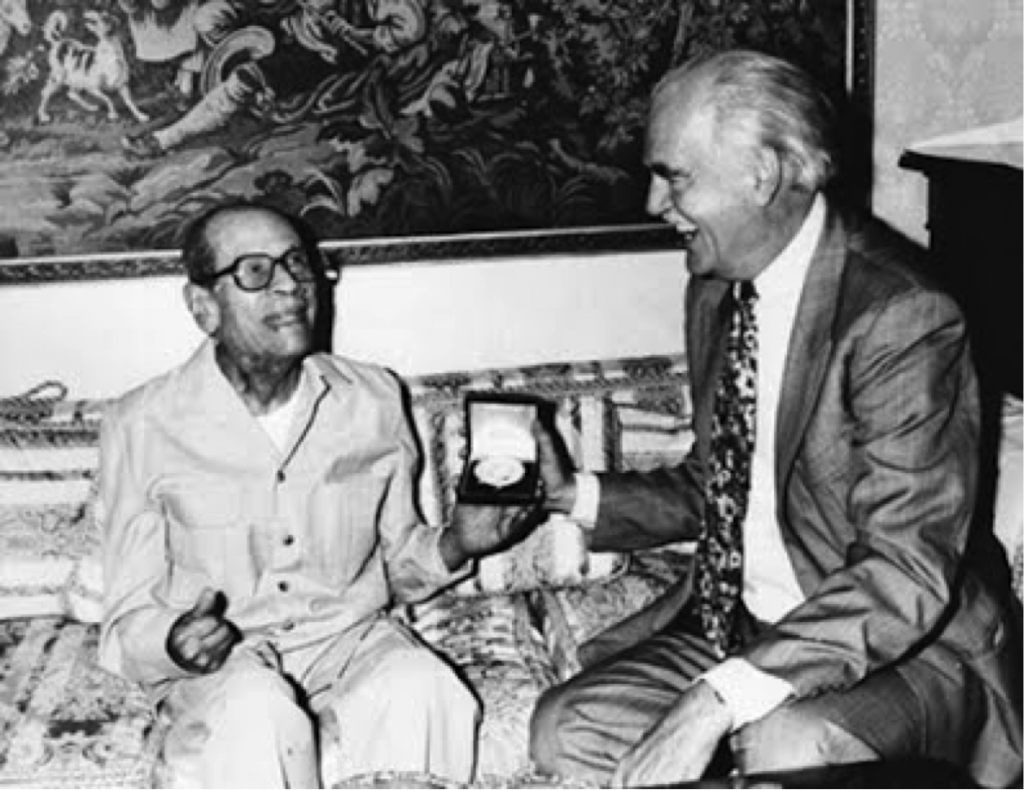Working to improve mutual understanding between the Middle East and the West
Working to improve mutual understanding between the Middle East and the West
No products in the basket.

Werner Mark Linz was a German-born publisher, who wanted to build bridges between cultures and continents. He was the founder of the New York publishing house Continuum and for over fifteen years director of the American University in Cairo Press.
Linz was a passionate advocate for scholarship, literature, and all forms of writing both from and about the Middle East and North Africa. He was instrumental in bringing the work of Naguib Mahfouz to an international audience and collaborated with him to set up the Naguib Mahfouz Medal for Literature, an annual literary prize for a novel in Arabic.
After Linz’s death in 2013, his vision and commitment helped inspire the foundation of a not-for-profit organisation initially called the Werner Mark Linz Memorial Library of West Asian and North African Thought, with the intention of publishing a series of academic books about the MENA region. In 2014, on becoming a charity, it was renamed Gingko Library (the ‘gingko’ image is from a poem by Goethe – see below). It is now simply GINGKO.
Between 2014 and 2017, GINGKO organised four academic conferences and a number of public lectures.
The ‘New Divan’ project (launched in 2015 and running through to 2019) brought together contemporary poets from MENA and the West in a unique lyrical dialogue to celebrate the 200th anniversary of Goethe’s trailblazing West-Eastern Divan in 1819.
In 2018, GINGKO launched its Interfaith Fellowship, bringing together early career postgraduate students (mostly of religion or theology) from Cairo’s Al Azhar University and Western universities at an annual retreat.
From this time, the idea of ‘encountering the other’, became a central part of GINGKO’s thinking. GINGKO went on to organise and support a number of ‘encounters’, from scriptural reasoning sessions to a series of workshops enabling young people from across the Arab world to meet online.
In 2023, GINGKO expanded its grant programme. It now offers small to medium-sized grants for academic research, conferences, and symposiums and for people wishing to organise their own interfaith or intercultural encounters.
GINGKO continues to publish academic books about MENA, under the expert guidance of its series editors, and now focuses on three subject areas: the history, art history and religions of the region.
In the years since 2018, the Fellowship has flourished and continues to expand. The Fellows have gathered every year for an international retreat – online during the Covid years. It has a burgeoning alumni/ae network and since 2020 has awarded the Collaboration Prize to two or more Fellows wishing to work on an interfaith research project.
Why GINGKO?
Gingko Biloba
The gingko, that Eastern tree,
In my garden plot now grows.
In its leaf there seems to be
A secret that the wise man knows.
Is that leaf one and lonely?
In itself in two divided?
Is it two that have decided
To be seen as one leaf only?
To such questions I reply:
Do not my love songs say to you
– Should you ever wonder why
I sing, that I am one yet two
(Translation: Anthea Bell)
Goethe sent this poem to his beloved friend Marianne von Willemer in 1815 as an ode to friendship. To him, this leaf symbolised the union between old and young, man and woman, human and the Divine, literature and scholarship, and East and West – a union which in his mind was inseparable.
The poem became part of his West-Eastern Divan, which Goethe was inspired to write when he read the first German translation of the divan composed by 14th century Persian poet Hafiz. Goethe called Hafiz his ‘twin’ and decided to enter into a lyrical dialogue with ‘the Other’. The West-Eastern Divan, published in 1819, was Goethe’s attempt to broaden the horizon of readers both ignorant and fearful of the Islamic world.
Two centuries on, GINGKO seeks to advance this discourse and promote a deeper, more meaningful understanding between the Middle East and North Africa and the West.
Our work relies on the generous support of our donors. Any contribution, no matter how small, helps us achieve our aims.